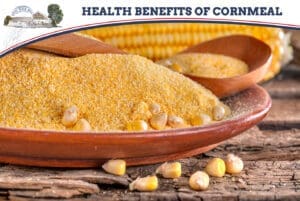Revealing the Health Benefits of Cornmeal
Published on September 17, 2024
 Have you considered adding more cornmeal to your meals to enhance their nutritional quality? Cornmeal, a staple ingredient in many traditional dishes, is often overlooked in modern diets despite its rich nutritional profile and delicious flavor. Made from ground, dried corn, this versatile grain can provide significant health benefits when incorporated into daily meals. Whether you’re looking for a nutrient-dense ingredient to enhance your diet or seeking ways to add wholesome and flavorful foods to your cooking, cornmeal is a fantastic choice. At The Butte Creek Mill in Eagle Point, Oregon, we take pride in providing fresh, stone-ground cornmeal that preserves the natural goodness of corn. In this article, we will explore the nutritional profile of cornmeal, the health benefits of cornmeal, and finally, how to incorporate cornmeal into your daily diet.
Have you considered adding more cornmeal to your meals to enhance their nutritional quality? Cornmeal, a staple ingredient in many traditional dishes, is often overlooked in modern diets despite its rich nutritional profile and delicious flavor. Made from ground, dried corn, this versatile grain can provide significant health benefits when incorporated into daily meals. Whether you’re looking for a nutrient-dense ingredient to enhance your diet or seeking ways to add wholesome and flavorful foods to your cooking, cornmeal is a fantastic choice. At The Butte Creek Mill in Eagle Point, Oregon, we take pride in providing fresh, stone-ground cornmeal that preserves the natural goodness of corn. In this article, we will explore the nutritional profile of cornmeal, the health benefits of cornmeal, and finally, how to incorporate cornmeal into your daily diet.
The Nutritional Profile of Cornmeal
A warm piece of cornbread drizzled with honey is the perfect complement to a bowl of chili, but have you ever considered how it’s good for your health? Cornmeal offers a variety of nutritional benefits that make it a valuable addition to a healthy diet. Packed with essential vitamins, minerals, and fiber, cornmeal contributes significantly to overall wellness. As a whole grain, it is an excellent source of complex carbohydrates that provide sustained energy throughout the day. These slow-digesting carbohydrates help stabilize blood sugar levels, making cornmeal an ideal choice for those seeking to avoid sharp spikes and crashes in their energy levels, often associated with simple sugars.
Another key benefit of cornmeal is its high fiber content. A diet rich in fiber promotes digestive health and reduces the risks of constipation. Fiber is also known to help lower cholesterol levels and support heart health, lowering the risk of cardiovascular disease. In addition to its fiber content, cornmeal is naturally gluten-free, making it an excellent alternative for individuals with celiac disease or gluten sensitivity. It allows those on a gluten-free diet to enjoy a variety of baked goods and other dishes without sacrificing flavor or texture.
Cornmeal is also packed with essential nutrients. It contains B vitamins, such as thiamine (Vitamin B1) and niacin (Vitamin B3), which are essential for converting food into energy and supporting nerve function. The grain is also rich in iron, a vital mineral responsible for producing hemoglobin, which helps transport oxygen throughout the body. Consuming iron-rich foods like cornmeal can prevent iron-deficiency anemia. Cornmeal also provides magnesium, which plays a role in numerous biochemical reactions in the body, including muscle function, nerve transmission, and blood pressure regulation. Finally, cornmeal is naturally low in fat, making it a healthy option for those looking to reduce their fat intake while maintaining a balanced diet. Its versatility allows it to replace higher-calorie ingredients, helping you enjoy flavorful dishes without compromising nutrition.
Health Benefits of Cornmeal
Beyond its impressive nutritional profile, cornmeal offers several health benefits that can lead to better overall well-being.
1. Supports Digestive Health
The high fiber content in cornmeal supports healthy digestion by aiding in the movement of food through the digestive tract. This can reduce the risk of constipation, promote gut health, and help manage weight by keeping you feeling full for longer.
2. Promotes Heart Health
Diets high in fiber, such as those that include cornmeal, have been shown to lower cholesterol levels and reduce the risk of heart disease. Additionally, cornmeal’s magnesium content can help regulate blood pressure, further contributing to cardiovascular health.
3. Boosts Energy Levels
Cornmeal’s complex carbohydrates provide a steady release of energy throughout the day, making it an ideal food for maintaining stamina and preventing fatigue. Whether you’re starting your day with a hearty breakfast or need an energy boost for afternoon activities, cornmeal can be a reliable source of fuel.
4. Helps Maintain Healthy Blood Sugar Levels
Cornmeal’s low glycemic index (GI) means it won’t cause rapid spikes in blood sugar levels, making it suitable for individuals with diabetes or those looking to manage their blood sugar. The slow-digesting carbs in cornmeal help maintain steady glucose levels, preventing energy crashes and reducing the risk of developing type 2 diabetes.
How to Incorporate Cornmeal Into Your Daily Diet
Incorporating cornmeal into your daily diet is easy and a delicious way to add more nutrients to your meals. Its versatility makes it a fantastic ingredient for various dishes, from breakfast to dinner. One simple way to enjoy cornmeal is by making cornmeal pancakes or waffles. The slightly coarse texture adds a satisfying crunch to these breakfast staples while boosting their nutritional value. You can mix cornmeal with your regular pancake batter or try a recipe that uses 100% cornmeal for a gluten-free option. Either way, you’ll get a delightful and nutritious start to your day.
Another versatile dish is polenta, made by boiling cornmeal. Polenta is comforting and can be served in many different forms. You can enjoy it creamy as a side dish, allow it to firm up and grill or bake it, or top it with your favorite sauces, vegetables, or proteins for a complete meal. Cornbread is another classic way to highlight cornmeal’s rich flavor. Whether you serve it as a side to soups and stews or enjoy it with a drizzle of honey, cornbread is a satisfying and wholesome addition to any meal. To make it even healthier, you can opt for whole-grain cornmeal and reduce the added sugars.
Cornmeal is also excellent for breading and coating. It creates a crispy, golden crust for baked goods like muffins or breading fish, chicken, or vegetables before frying or baking. This method adds flavor and texture while keeping the dish lower in fat compared to traditional breading. For a warm and hearty breakfast, you can try cornmeal porridge. Boiling cornmeal with milk or water and sweetening it with honey, cinnamon, and fresh fruit makes for a nutrient-packed start to your day. It offers a unique flavor and texture that can break up the monotony of traditional oatmeal.
Finally, cornmeal can be used to make homemade tortillas or flatbreads, perfect for tacos, wraps, or dipping into soups and stews. The wholesome, earthy flavor of cornmeal adds depth to these dishes and ensures you’re incorporating more whole grains into your diet.
Get the Best Fresh-ground Cornmeal at The Butte Creek Mill
Cornmeal is a versatile, nutritious, and delicious ingredient that deserves a place in your pantry. Whether you want to enhance your diet with whole grains, experiment with new recipes, or enjoy a traditional dish, Butte Creek Mill’s fresh ground cornmeal is the perfect choice.
Stop by The Butte Creek Mill or shop our online General Store today to browse our selection of fresh, stone-ground cornmeal and other high-quality ingredients. Our products are milled with care to preserve the corn’s natural flavors and nutrients, ensuring that every dish you make is as nutritious as it is delicious. Add Butte Creek Mill’s cornmeal to your cart today and start reaping the health benefits of this wholesome, versatile grain!
